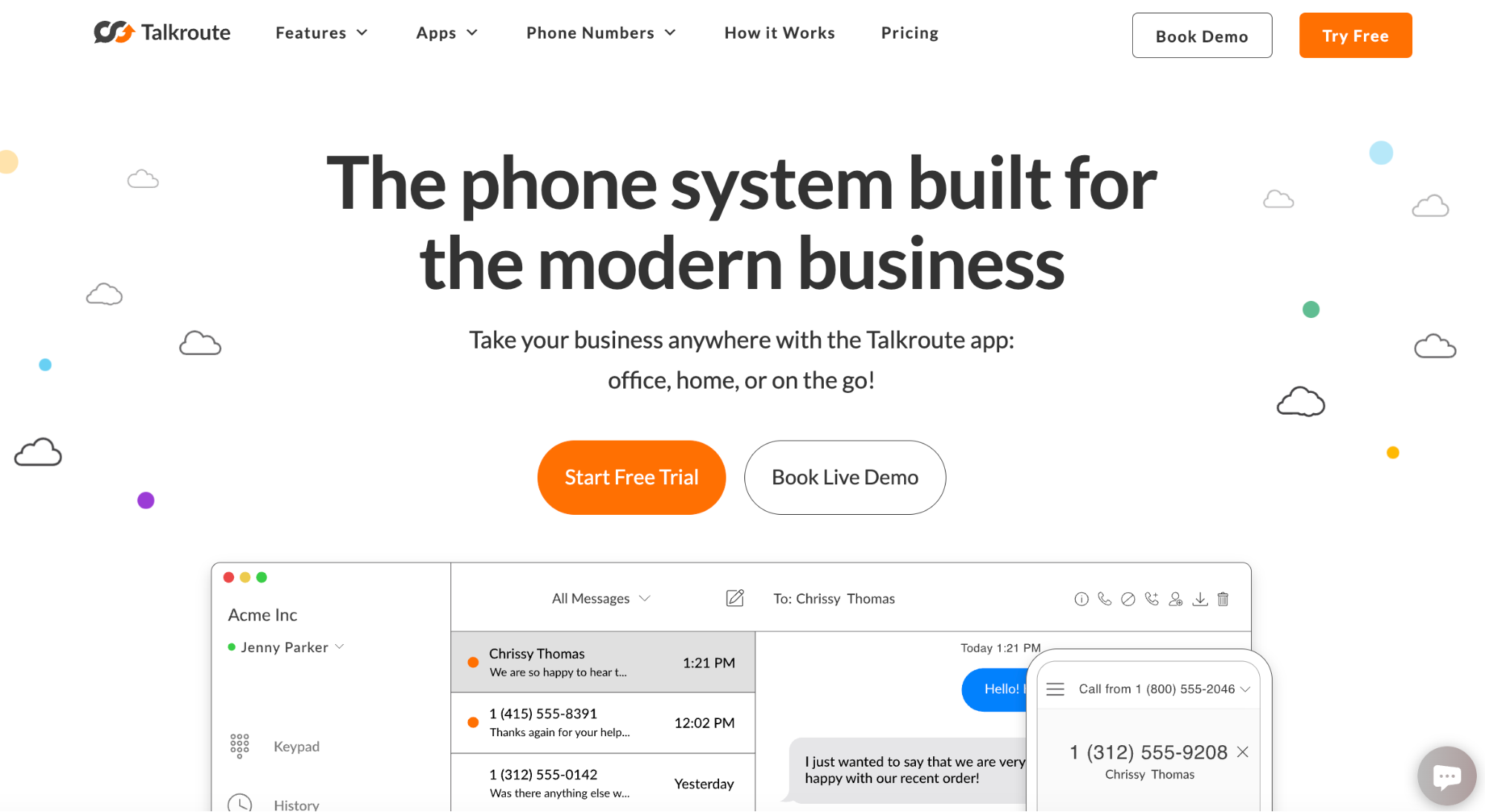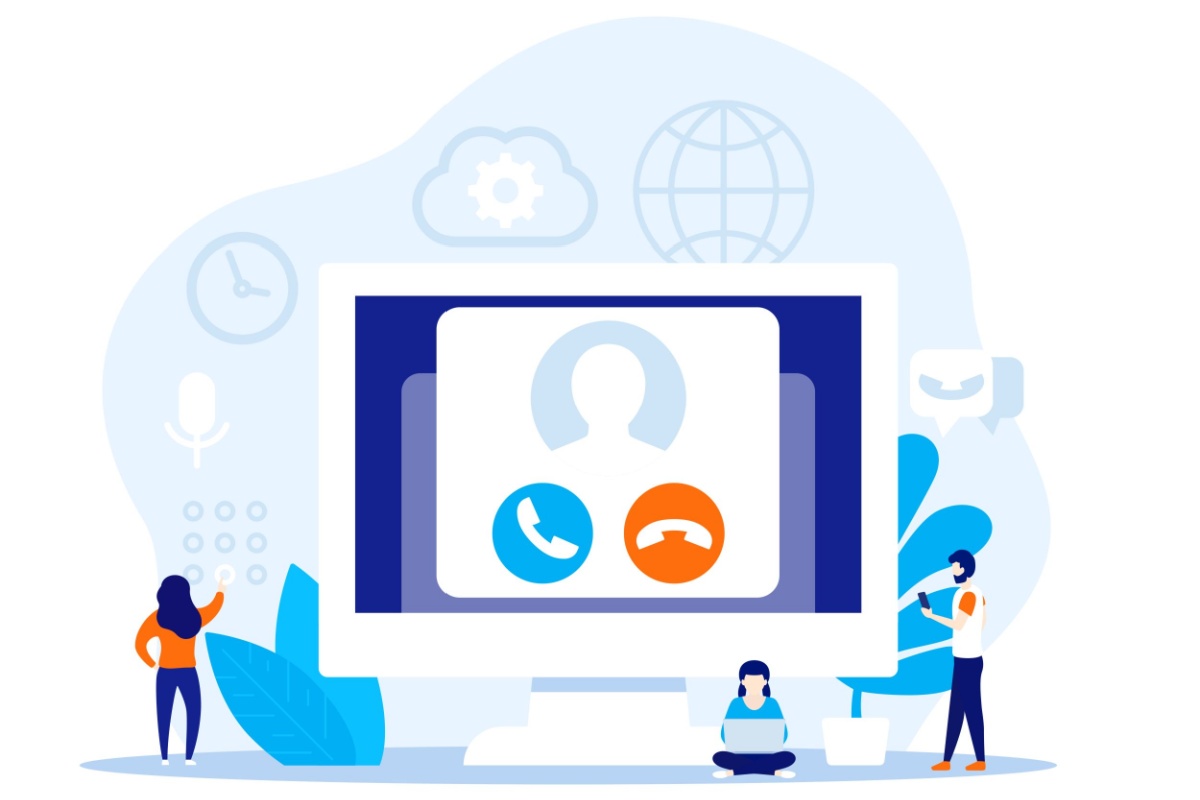Choosing a phone system might seem like a small decision, but it can have a big impact on your business. If you deal with missed calls, poor sound quality, or limited features, it can slow things down and frustrate your team.
Some businesses still rely on landline systems, while others are switching to internet-based options like VoIP phone services. With more people working from different locations and needing flexible tools, the phone system you use matters more than ever.
If you are not sure which option fits your business best, you are in the right place. This article will walk you through the differences between VoIP and landline phones.
We will cover features, pros, cons, and more so you can make the right choice for how your business communicates.
What is a Landline?
A landline is a phone that works through a wired connection. It uses copper wires to carry your voice from one place to another. This setup is often called plain old telephone service, or POTS for short.
Most business landline systems are part of what we call analog phone systems. These systems have been around for a long time.
Before the internet and mobile phones, people relied on traditional phone service to make calls. The sound travels through a physical landline connection, not the internet.
Even with newer options like mobile and internet-based phones, many businesses are still familiar with and prefer to use the landline.
Don’t settle for the old telephone service. Discover how Talkroute keeps it clean and easy.
What Landline Phones Offer You
Here’s what you can expect when you go with a landline:
Clear And Consistent Voice Calls
Landline phones give you clear and steady voice calls. They use a wired landline connection, so they are not affected by internet problems or mobile signal drops.
Your calls stay smooth, which helps when you’re speaking with clients or vendors. You don’t have to repeat yourself or deal with choppy audio.
You Can Always Receive Calls
Landlines work even if your internet is out. So when Wi-Fi fails or your cell phone has no signal, you can still receive calls. This gives you peace of mind because you know your business line will stay open for important customer calls.
Set Up Through A Local Phone Company
Setting up a landline is easy. Just call your local phone company or a phone service provider. They take care of the wiring and setup. You don’t have to install apps or deal with software. Once it’s connected, the phone is ready to use.
A Trusted Option For Business Phones
Many businesses still use landlines because they are simple and dependable. You don’t need updates, and you don’t have to learn anything new. It’s a phone that just works. For business owners who want something easy and steady, a landline is a good choice.
Designed for remote teams and office setups alike. See how Talkroute supports both.
Drawbacks of Using Landlines
Landlines are known for being steady and simple. But they also have some downsides, especially when compared to newer phone systems. If you’re thinking about using a landline for your business, it’s helpful to know where it might fall short.
Limited Features Compared To Modern Systems
Landlines are good for making and receiving calls, but that’s about it. You won’t get features like call forwarding, voicemail-to-email, mobile apps, or video meetings. If you want a phone system that does more than basic voice calls, you may feel limited.
Harder To Use On The Go
Landlines are tied to a physical location. You need to be near the phone to answer it. This can be a problem if you move around during the day or want to take customer calls from outside the office. You can’t take your landline with you like a mobile phone or an app-based system.
Setup Can Take Time
Setting up a landline means dealing with wires, phone jacks, and sometimes waiting for a technician. If your business moves or grows, adding more lines can be slow and costly. In comparison, cloud-based systems can be set up quickly without extra equipment.
Ongoing Costs From Phone Service Providers
With landlines, you often pay monthly fees to a phone service provider or local phone company. These costs can add up, especially if you need extra features or long-distance calling. And unlike some VoIP services, you don’t get as many tools included in the base price.
What is VoIP?
VoIP stands for Voice over Internet Protocol. In simple terms, it’s a way to make phone calls using the internet instead of copper wires. With VoIP technology, your voice is turned into digital data and sent over your internet connection.
A VoIP phone line works a lot like a landline, but it connects through the internet. You can use it with a desk phone, a computer, or even a mobile app. Many businesses today use a VoIP telephone system because it gives them more flexibility and features than older landline systems.
Want a VoIP system that’s easy and flexible? Give Talkroute a try.

Features of VoIP
VoIP phone systems come with many helpful tools that go beyond just making calls. These features make it easier for you to stay connected and manage business calls with less hassle.
Access Voicemail Through Email Or App
VoIP makes it easy to manage your voicemail. You can get voice messages sent straight to your email or check them in an app on your phone or computer.
Many services also turn the voice message into text so you can read it quickly. This saves time and helps you stay organized when you’re handling lots of calls.
Set Up Call Forwarding And Call Routing
VoIP lets you forward calls to another number or send them to the right person automatically. You can set rules like sending calls to your mobile after hours or routing calls based on the department the caller chooses.
This helps your team handle calls faster and keeps customers from waiting too long or getting sent to the wrong place.
Enjoy High-Quality Voice Calls
VoIP calls are clear and reliable when your internet is strong. You don’t have to deal with the buzzing or static sounds that sometimes come with old phone lines.
Clear voice quality makes it easier to have smooth conversations and helps your business sound more professional to customers.
Use Mobile And Desktop Apps
Most VoIP service providers offer easy apps you can install on your phone, tablet, or computer. These apps let you make and receive calls, send texts, check voicemail, and more.
You can work from anywhere using the tools you already have, without needing extra hardware or special setups.
Add Or Remove Users Easily
When your team grows, your phone system can grow with you. You can add new users through a simple dashboard without waiting for someone to install new lines.
If someone leaves, you can also remove them in just a few steps. It’s a flexible setup that keeps up with your changing business needs.
Connect With Other Business Tools
A VoIP telephone system can link up with other tools your team already uses, like your CRM, help desk, or email.
This makes it easier to see caller info, log interactions, or track support tickets during or after a call. Everything works together, which saves time and makes your team more productive.
Choose From Many VoIP Service Providers
There are lots of VoIP phone system service providers on the market, and they offer different plans and features. Some are built for small businesses, while others are made for large teams.
This gives you the freedom to compare services, find one that matches your needs, and change providers if something better comes along.
Scale Your System As Your Business Grows
Whether you’re just starting or growing quickly, a VoIP business phone system can adjust with you. You can add more users, expand to new locations, or upgrade your features without changing your whole system.
It’s built to grow with your business and make changes easy when you need them.
Get the control you need with a VoIP platform that’s actually easy to manage. Check out our demo.
What Makes VoIP a Better Option?
If your team depends on fast and flexible business communications, VoIP can be a better fit than traditional landlines. Here’s a closer look at what makes VoIP a better option:
Works With Mobile Phones and Computers
VoIP is not tied to one location. You can use it on mobile phones, laptops, tablets, or desktop computers.
Whether you’re at the office or on the go, your team can stay connected. You don’t need a special device either. A regular cell phone with an app can turn into your full business phone.
Runs on Your Internet Connection
VoIP uses your existing internet access instead of phone wires. If you already have a solid connection, you can get started right away.
There’s no need to install new lines or wait for a technician. As long as your Internet service provider offers good speed and uptime, your VoIP system will work smoothly.
Easy To Set Up and Use
Most VoIP systems are simple to install. You can often set everything up online without needing extra hardware.
Many providers also give you apps that are ready to go once you sign in. It’s much easier than setting up a traditional phone line.
More Features for Business Needs
VoIP gives you tools like call routing, voicemail-to-email, mobile apps, and more. These features help you manage your business communications better and respond faster to customer needs. You get more control and flexibility with every call.
Choose Your Own Business Phone Number
With VoIP, you can pick a number that works best for your brand. This includes local numbers that make you look nearby, toll-free numbers that are easy to call, or vanity numbers that spell out your business name.
It gives you a professional presence and helps people remember how to reach you.
Things to Note When Using VoIP
VoIP comes with many benefits, but there are a few things you should know before switching. These points will help you decide if VoIP fits your business setup and needs.
It Depends on Internet Access
VoIP works through the internet, not phone lines. This means your call quality depends on your internet access. If your internet is slow or cuts out often, your calls may drop or sound unclear. A strong connection from a reliable Internet service provider makes a big difference.
It Won’t Work During Power Outages
Unlike landlines, most VoIP systems stop working if your power goes out. That’s because your phone runs through your modem or router. Some businesses use battery backups or keep a mobile phone as a backup in case of emergencies.
Emergency Calls May Be Handled Differently
VoIP handles emergency calls in a different way from traditional phone systems. Location tracking is not always automatic.
You may need to enter your address manually so emergency services can find you. It’s important to check how your VoIP provider handles 911 or local emergency calls.
Call Quality Can Change
Most of the time, VoIP offers clear sound. But if your network is crowded or your connection is weak, the quality can drop. Things like video streaming, large downloads, or poor Wi-Fi can affect your business communications. A wired connection often helps.
Devices and Equipment Matter
You can use VoIP on your computer, cell phone, or with VoIP desk phones. Some businesses choose to buy special hardware, but it’s not required. Make sure the devices you use are up to date and compatible with your VoIP phone service provider.
Recommended reading:
How to Get a Second Phone Line for Business in 3 Easy Steps
How to Forward a Landline to a Cell Phone (3 Ways)
Say Goodbye to Landlines. Say Hello to Talkroute.

Tired of being tied to your desk just to answer a call? Traditional landlines keep you stuck in one place, with limited features and no flexibility. Talkroute gives you the freedom to run your business from anywhere, without missing a call.
As a VoIP system, Talkroute works on your desktop, mobile phone, or browser. No bulky hardware. No expensive setup. Just smart features like auto attendant, call menus, custom voicemail greetings, call forwarding, and voicemail-to-email, all in one simple app.
- Run your business calls from anywhere – Take calls at home, in the office, or on the go using your desktop, mobile phone, or browser. No need to stay tied to a desk phone.
- Use auto attendant features to guide callers – Create a professional call menu that directs customers to the right team or department without live help.
- Send and receive texts from your business number – Manage SMS messages through your Talkroute number so you can stay connected even when you can’t talk.
- Forward calls to any device, including your mobile – Route calls to your cell phone, landline, or desktop so you never miss an important conversation.
- Get voicemails with email alerts and transcriptions – Receive voicemail messages by email, complete with caller info and written transcriptions you can read on the spot.
- Avoid the cost and limits of old-school landlines – Skip expensive phone setups and hardware. Talkroute gives you more features at a lower cost.
- Set up quickly with no special hardware needed – You can be up and running in minutes. All you need is your existing phone, computer, or web browser.
One week, full access, no commitment. Experience Talkroute’s VoIP system. Start your trial now.
FAQs About VoIP vs Landline
What is one disadvantage of using VoIP?
One downside of a VoIP phone system is that it relies on a stable internet connection. If your internet service goes down or slows, your VoIP call quality can drop or stop completely.
Unlike traditional landline phones, VoIP telephony doesn’t work well during power outages unless you have backup power or mobile devices.
Can a VoIP phone be used as a landline?
A VoIP phone can replace a traditional landline phone system, but it works differently. Instead of using a physical connection through the public switched telephone network, VoIP calls use voice over internet protocol to send data packets over the internet.
With the right setup, it can feel just like using landline telephones, especially on a desk phone.
What will happen when landlines go digital?
As landline phone systems go digital, traditional landline phones that use analog signals will be phased out. Phone calls will move to VoIP systems or other internet protocol–based setups.
Many VoIP providers are ready to support the switch, offering advanced call routing, voicemail, video conferencing, and virtual phone system features.
How much does VoIP cost per month?
VoIP services usually cost less than traditional landline phone service. Most VoIP providers offer plans starting around $15 to $30 per user per month for a basic business phone system.
Prices can vary depending on features like call recording, call queues, and video calls, but many VoIP providers make it easy to scale with just a few clicks.

Stephanie
Stephanie is the Marketing Director at Talkroute and has been featured in Forbes, Inc, and Entrepreneur as a leading authority on business and telecommunications.
Stephanie is also the chief editor and contributing author for the Talkroute blog helping more than 200k entrepreneurs to start, run, and grow their businesses.




